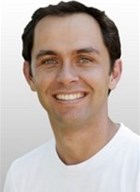Tim Noakes spent the majority of his professional career espousing a high-carb low-fat (HCLF) diet. He wrote books, he started the Sports Science Institute, he ran marathons. If diet were a religion, then HCLF was the Catholic Church and Tim was a cardinal. And then he changed his mind...
In 2010 Tim realised that HCLF was bad advice. In fact, the best diet for many people was low-carb, high-fat, (LCHF). The Catholic Church was wrong, and so Tim launched a Reformation for the religion of diet in South Africa. He became our Martin Luther.
It could not have been easy. He was famous. He was emotionally and reputationally committed to HCLF. He knew he would look like a fool backtracking on his decades of preaching. He had to make a choice. Admit he was wrong and get on the right track, or keep plugging away on the wrong path.
Be courageous or be a sheep.
He swallowed his ego and did the right thing. He did it in public, for all his colleagues, fans and friends to see. From then on he became the leading Banting advocate in South Africa, reinventing himself as the chief evangelist of high-fat, low-carb diets.
Today, CIOs in South Africa face a similar dilemma to that of Tim in 2010. Since the beginning of IT time, the accepted wisdom has been to “keep it in-house, on-premise, locally-hosted”. Manage your own security. Build your own applications.
But times have changed. The arrival of always-connected smart devices, online encryption, and web applications mean that the old dogma is outdated. The internet is here, and with it comes an entirely new way of thinking about corporate IT.
CIOs today are faced with a choice: stick to the old ways, or embrace the power of the internet. Stay in the Catholic Church or join the Reformation.
On the face of things, it’s a simple decision. The old ways are dead. The “cloud” is the future. Everything is on the web. There’s no need to go “all-in” on one software suite, forced to accept specific modules that are not needed or even usable.
IT has become like music. Instead of having to buy an album with songs you don’t want, you can now create your own playlist. And you can store it in the cloud.
Nowadays we don’t think twice before choosing the best-of-breed web-apps to communicate (Slack), store photos (iCloud), handle databases (Oracle), and manage sales (Salesforce). No longer do you need to be a slave to what your IT systems allow you do to. You can take back your company.
And yet the majority of CIOs at big companies in South Africa are still hesitant. They’d rather go down the tried-and-tested path of bespoke software, local servers, encrypted VPNs.
“We’ve always done it this way. Why change?"
It’s like the Thanksgiving turkey. Every day of its life it is fed and kept warm, and so it starts to expect the same treatment for the rest of its days. It's only when Thanksgiving arrives that it reevaluates its mental model, by which time it’s too late.
CIOs face a turkey moment. Pretend nothing has changed and be served up for dinner, or accept the new paradigm, embrace the internet as the core platform for enterprises, and move to the cloud.
Are you a CIO? Are you a CEO with the wrong CIO? Do you have the guts to publicly change your mind? Can you ignore the naysayers? Block out the jeering?
It won’t be easy. But you don’t have a choice. The internet has won. The only decision facing you is which side of history will you be on.
“When the facts change, I change my mind. What do you do?” John Maynard Keynes



































